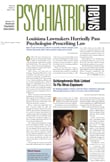APA has launched a new Web site designed to keep mental health professionals and the public informed about research and related activities relevant to DSM-V, the next revision of the Diagnostic and Statistical Manual of Mental Disorders.
Called the “DSM-V Prelude Project: Research and Outreach,” the new site provides an opportunity for all DSM users to participate in the earliest stages of the revision process by submitting comments and suggestions for DSM-V. The revision is slated to begin formally in 2007.
Developed under the auspices of APA’s Division of Research, led by Darrel A. Regier, M.D., M.P.H., the site is directed by Michael B. First, M.D., an associate professor of psychiatry at Columbia University and a consultant to APA on DSM activities.
“We intend for the DSM-V Prelude Project Web site to promote and facilitate an ongoing dialogue between APA and DSM users,” First said. Toward that end, he said, the site contains a “Research” section that provides site visitors continuous updates on APA’s research activities related to DSM and an “Outreach” section that affords DSM users a means of communicating with APA about the diagnostic manual.
Among the research-planning activities designed to stimulate diagnostic studies well before the DSM-V revision formally begins is the APA monograph “A Research Agenda for DSM-V,” a summary of which is linked to the site. In addition, in February the American Psychiatric Institute for Research and Education (APIRE) launched a series of 10 diagnostic research conferences that will be convened over the next four years. The series is titled “The Future of Psychiatric Diagnosis: Refining the Research Agenda.”
In his role as executive director of APIRE, Regier is the principal investigator on the five-year, NIH-funded grant under which APA will convene the conference series. First and William E. Narrow, M.D., M.P.H., associate director of APA’s Division of Research, are co-principal investigators on the conference grant. A summary of each conference will be posted in the Research section of the Prelude site as it occurs.
The “Outreach” section of the site provides DSM users with the opportunity to be a part of the DSM-V development process. “The DSM-user community is an important source of information regarding the identification of problems and limitations with DSM-IV-TR,” First said. Thus, the Web site provides visitors a mechanism for notifying APA about perceived problems with DSM-IV-TR and making suggestions for DSM-V. All suggestions will be entered into the DSM-V Prelude data base for eventual referral to the relevant DSM-V work groups.
“We are planning to provide all those who submit suggestions with specific feedback about their suggestions and establish a dialogue about possible research directions to be considered,” he said.
Users submitting comments are asked to select from a list of possible categories for their suggestion. Categories are available for commenting about problems, limitations, or shortcomings in DSM-IV-TR; suggesting specific changes in DSM-IV-TR criteria sets or in the diagnostic groupings (for example, to move obsessive-compulsive disorder out of anxiety disorders and into its own diagnostic class); suggesting that a new subtype be added to an existing disorder; suggesting a new disorder; and recommending that an existing disorder be deleted.
First said that for each category, guidelines are provided for the types of research that are needed. Proposals for new disorders, for example, should cite literature supporting the claim that a proposed disorder describes a condition that is not adequately covered by existing DSM-IV-TR categories; literature supporting the claim that adding the disorder will improve clinical utility; and literature indicating that adding a proposed new disorder will carry a low risk of false positives in applying the diagnosis.
The Web site will permit those who submit comments or proposals to attach supporting documents in any format, such as text files, spreadsheets, Microsoft PowerPoint presentations, and SPSS data files.
The Prelude site also includes a free registration box to receive an electronic DSM-V newsletter that APA will issue periodically pending publication of the updated manual, projected for 2012. The Web address of the “DSM-V Prelude Project: Research and Outreach” is www.dsm5.org. ▪
